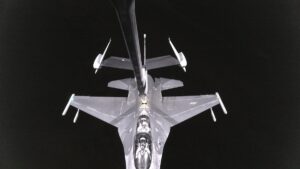New Space Force Component Launched in Japan Amid Rising Pacific Tensions
The United States has taken a significant step in bolstering its space collaboration with Japan. As geopolitical tensions with China intensify, the U.S. Space Force has established a new service component in Japan, marking a strategic expansion of its operations.
On Wednesday, U.S. Space Forces Japan, the sixth service component of the Space Force, was inaugurated at Yokota Air Base. Lt. Gen. Stephen Jost, commander of U.S. Forces Japan and the 5th Air Force, highlighted the significance of this development as Japan’s Ministry of Defense enhances its space capabilities. “As we both continue to advance our space capabilities side-by-side, the establishment of United States Space Forces-Japan is the next step in growing our multidomain proficiency and our overall contribution to the defense of Japan and the region,” Jost stated.
The Space Force has been expanding under U.S. Space Command, with recent additions in the Indo-Pacific, Central, European, and Africa Commands. This expansion aligns with the Department of the Air Force‘s strategy to refocus its resources and efforts on major global challengers such as Russia and China.
Japan joins South Korea as the only other country to host a subordinate component of the Space Force, with the latter stationed at Osan Air Base in South Korea. Victoria Samson, the chief director of space security and stability at the nonprofit Secure World Foundation, emphasized the importance of these selections. She noted that the U.S. aims to strengthen its alliances in response to the perceived threat from China, stating, “I think it speaks to concerns that the U.S. has about China, let’s be honest, and I think that tracks with how the U.S. military officials have been speaking about the next threat to the U.S. in space.”
China’s advancements in space warfare are documented in the Secure World Foundation’s 2024 Global Counterspace Capabilities report. This analysis highlights China’s development of direct-ascent anti-satellite capabilities and potential direct-energy weapons. Although China publicly maintains its peaceful stance, unofficial narratives suggest a shift towards space as a military domain.
While Japan’s space program is not as advanced as that of the U.S. Department of Defense, it is exploring the development of counterspace capabilities, albeit without any known offensive systems, according to the Secure World Foundation’s report. The potential for Japan to leverage its missile defense system as an anti-satellite capability exists but remains untested.
Samson pointed out the strategic advantage of this collaboration, as the U.S. and its allies could benefit from each other’s capabilities in the future, enhancing their collective space defense strategies.










